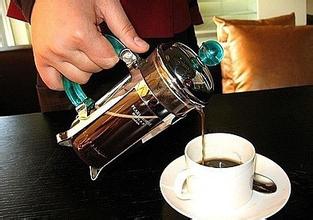The Coffee Film introduces the documentary Fair Trade Coffee.
BlackGold (Black Gold, 2006) is a documentary about Ethiopian coffee growers facing exploitation by Western multinationals. The narrative style of the film is very simple, and the camera constantly switches between two worlds that are very different: the elegantly dressed Italian "a beautiful day begins with a cup of coffee in the morning", while the coffee grower lives in a humble abode in a rough shirt and barefoot; on the coffee markets in New York and London, no one paid any attention to the grower's question, "can you raise the price of a kilogram of coffee to 5 Bill (about $0.6)?" Let's have the money to build schools for our children. "the female manager of the world's first Starbucks in Seattle is very proud of the coffee culture represented by Starbucks, not knowing that Ethiopian women work eight hours a day for less than $0.50. Representatives of the economic powers at the WTO global conference negotiated the best trade strategy for them behind closed doors, and growers had to cut down coffee fields and plant Chat, a hallucinogenic drug, which was a little more expensive, in order to feed their families.
The scene that impressed me most was when a grower said, "We do not need assistance from the Western world, nor do we want our children to see us receiving handouts." We have coffee and can survive on our own labor, as long as we can give us a fair price. " But the subtitle at the end of the film makes it clear that four of the world's largest multinational coffee companies, Kraft, Nestl é, Procter & Gamble and saralee, as well as Starbucks, have declined invitations to watch the film.
This is indeed a heartbreaking film after watching, because you have to accept the fact that, whether you know it or not, every cup of coffee you drink increases the exploitation of coffee growers in Africa and South America.
To put it simply, to organize coffee growers and work directly with independent coffee vendors to make the transaction price transparent and fair, this is "Fair Trade Coffee". After the film was published, it quickly gained a great response in the international community. Starbucks was forced to say it would use Fairtrade coffee beans globally in 2015. But at home, we are still unable to drink Fairtrade coffee in Starbucks for a while.
So what can we do to reduce the unfair coffee trade? You can try to buy coffee with the Fairtrade logo, such as the British brand "Percol" or "Caf é Direct"; if you often go to Hong Kong, you can pay attention to those shops that use Fairtrade beans, which are quite a large number in Hong Kong; or just go to Tudou to watch the documentary in its entirety.
Taking action to support Fairtrade requires money (Fairtrade coffee is more expensive) and patience (not necessarily better). Can we lighten our guilt a little bit when we pick up a cup of coffee?

Important Notice :
前街咖啡 FrontStreet Coffee has moved to new addredd:
FrontStreet Coffee Address: 315,Donghua East Road,GuangZhou
Tel:020 38364473
- Prev

Knowledge of planting Coffee beans there are four types of coffee trees
Coffee comes from Ethiopian curry. In Colombia, it was brought by a priest from the French Antilles via Venezuela in 1808. At present, Colombia is the fourth largest coffee producer in the world, behind Brazil, Vietnam and Indonesia. Finally, I have an opportunity to witness the formation of coffee. This is a visit to QUINDIO, Colombia.
- Next

The difference between Nanyang Coffee and White Coffee
It is said that human beings have had the habit of drinking coffee around the 10th century. Locally, the coffee we drink is mainly divided into two categories: Nanyang coffee and white coffee. Compared with the people of Chaozhou and Fujian, the people of Hainan are a group of dialects who came to the south later. Under the circumstances that various industries have been occupied by people from other places of origin, in order to make a living, many early Hainan people who went south had to help or work in foreign families.
Related
- Beginners will see the "Coffee pull flower" guide!
- What is the difference between ice blog purified milk and ordinary milk coffee?
- Why is the Philippines the largest producer of crops in Liberia?
- For coffee extraction, should the fine powder be retained?
- How does extracted espresso fill pressed powder? How much strength does it take to press the powder?
- How to make jasmine cold extract coffee? Is the jasmine + latte good?
- Will this little toy really make the coffee taste better? How does Lily Drip affect coffee extraction?
- Will the action of slapping the filter cup also affect coffee extraction?
- What's the difference between powder-to-water ratio and powder-to-liquid ratio?
- What is the Ethiopian local species? What does it have to do with Heirloom native species?

